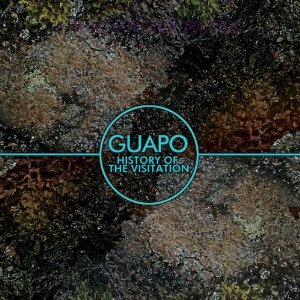As befits their often grandiose aesthetic, the history of Guapo is one of eras. For their first seven or eight years, they were a cacophonous and complex Skin Graft-style noise-rock outfit, enamoured with The Flying Luttenbachers and Ruins (with whom they collaborated, on 2000’s Death Seed). Touring members came and went, but they were essentially a duo, consisting of drummer Dave Smith (owner of the world’s most expressive drumface) and bassist Matt Thompson. With the arrival of keyboardist Daniel O’Sullivan, of Mothlite/Grumbling Fur/Ulver/Aethenor, their aesthetic became slightly more stately, but no less intricate. 2004’s Five Suns, the first in a trilogy informed by O’Sullivan’s lush keys and melodic sensibility, was a vastly cosmic conceptual suite that drank deeply from the bubbling Magma well.
In 2005, after recording and touring Five Suns’ nuclear-winter counterpart Black Oni, Thompson left to focus on his solo film-music project Rashomon, and later Zoltan. The Age of O’Sullivan came to a close with 2008’s Elixirs, the band’s most subtle and nuanced record, but one that blurred the lines between Guapo and the O’Sullivan-helmed Miasma & the Carousel of Headless Horses (for which Smith also played drums).
History Of The Visitation, then, marks the start of the Third Age. Like all civilisations and empires, it is both a radical break from and a continuation of that which came before. Most of the current line-up are road members of long standing, but History Of The Visitation is their first recording as an ensemble. Here alongside sole constant Smith are guitarist Kavus Torabi (of Knifeworld/Cardiacs/The Monsoon Bassoon/Chrome Hoof), bassist James Sedwards (of unfeasibly brilliant and criminally undersung London math titans Nøught) and Emmet Elvin (of Chrome Hoof/Knifeworld) on keys, plus an assortment of guests on woodwind and strings.
Brazenly and gloriously, it brandishes all the hallmarks of golden-era prog rock, but given a steroid boost and stripped of ego. No overarching concept is made specific, but the titles, artwork and the narrative arc of the music evoke a primordial Lovecraftian/Quatermass-esque horror edging its way into our world, be it from the farthest reaches of the cosmos or from within the churning guts of the Earth. Opening track ‘The Pilman Radiant’ renders Guapo’s proggy intent unequivocal – 26 minutes long, split into five movements, the titles of which (‘The Visitation’, ‘The Divine Vessel’, ‘The Wriggling Magnet’, etc.) all evoke queasy 1960s BBC sci-fi imagery. It begins with a looming drone, inching upwards in a spiral of anxiety as an ancient or otherworldly presence stirs. A gentle, exploratory Rhodes motif from Elvin, offset by Torabi’s increasingly exuberant skittering figures, segues into a hypnotically languorous lilt, while psychedelic electronics enhance the sense of drift and disembodiment. A stuttering two-chord keyboard riff heralds a heavier, more panicky section, the serrated cables of Sedwards’ bass foregrounded. Dreamlike near-ambient wibble comes next, the soundtrack to cryogenic suspension and precognitive visions. Finally, Torabi’s boundlessly optimistic guitar casts dazzling starbeams over the sleek, hurtling bulk of an escape pod in re-entry, Sedwards hits the distortion pedal and his bass roars with the shock of terrestrial gravity, the unfamiliar sensation of weight.
‘Complex #7’ provides a necessary interlude between the two opening and closing behemoths. Heavy bass thrum, fizzing electronics and hesitant woodwind establish an infested, decaying, once- industrial landscape populated only by weeds and ruptured concrete, the perfect setting for a grim second act.
A satisfying denouement is provided by ‘Tremors from the Future’. Initially almost blindingly bright, its neon interlocking geometry recalls Harmonia or Battles at their most uplifting. It hits a more discordant groove with Torabi’s rockabilly-gone-mutant twang and Smith’s juddering martial beats. Then, eight minutes in, a sublime resolving groove spills forth – at once titanium-hard, intricately arachnoid and outrageously funky – before collapsing into a slightly rueful fade to white.
With History of the Visitation, Guapo take classic prog tropes and revivify them, balancing the thrillingly inventive with the familiar and approachable, offering a brash new take on an old form, simultaneously looking to the past and the future – thereby reinforcing the nebulous retro sci-fi theme. Most incredibly, for all the changes in personnel and style, this is still recognisably the same band as the one that released Towers Open Fire 16 years ago. The essence of Guapo is strong, pervasive and potentially immortal. It seems to transcend its own membership – almost as if it’s become… self-aware…
My god…


